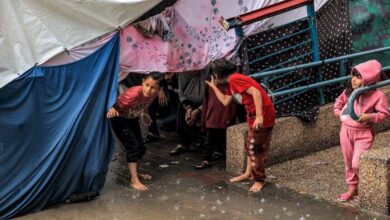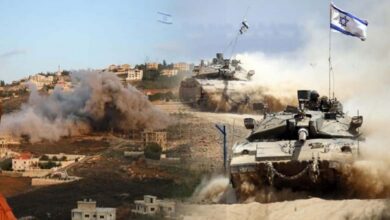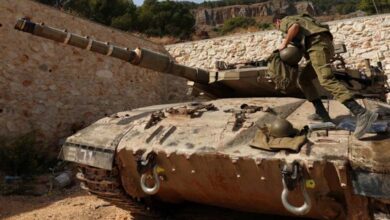Israel’s Ammunition Stock is Insufficient for a Prolonged War
Among the primary reasons for the deployment of the U.S. "THAAD" air defense system in Israel is the acute shortage of interceptors.

An Israeli report has highlighted the extreme pressures facing Israeli forces and the military establishment, noting that Israel’s ammunition stock is sufficient only for a short-term war and inadequate for a prolonged war of attrition, while the ongoing conflict burdens the Israeli economy, with many companies halting operations and the military calling up tens of thousands of reservists, who in normal times (peacetime) form a productive force.
-
“Target Tel Aviv”: Hezbollah’s New “Qader 2” Ballistic Missile
-
Iran Faces a Dilemma… Who Will Be the Successor to Hezbollah?
A report published by the Hebrew site “Ynet,” affiliated with “ Yediot Aharonot,” stated that Israeli defense industries are under pressure to increase the production of interceptors while meeting foreign orders. It added that the situation is compounded by restrictions on raw materials from some suppliers, particularly in Europe, raising the question, “Will the defense industries be able to meet the challenge?”
A report published by the British newspaper Financial Times on Monday highlighted one of the main reasons for deploying the U.S. “THAAD” air defense system in Israel, namely the acute shortage of interceptors.
-
Maher Al-Assad Abandons Hezbollah to Avoid Israeli Strikes
-
Finances under fire: Hezbollah faces financial crisis
This underscores the ongoing challenge the Israeli military faces regarding the availability of various munitions as the war, now entering its second year, shows no signs of nearing an end.
THAAD, which will be operated in Israel by approximately 100 American soldiers, is expected to integrate with existing Israeli air defense units to help manage additional ballistic missile attacks, which may be more extensive than those launched by Iran against Israel so far.
This system will complement the “Arrow 2” and “Arrow 3” interceptor missile systems, as well as the “David’s Sling” system, which have formed the backbone of Israel’s defense against two waves of missile attacks from Iran—one in mid-April and the other earlier this month.
-
Hezbollah Prepares for War of Attrition with New Leadership to Lead the Battle
-
One of them was a missile system commander… Israel kills Hezbollah leaders
During the April attack, Iran launched 185 drones, 110 ballistic missiles, and 36 cruise missiles at Israel. Earlier this month, in response to the assassination of Hezbollah leader Hassan Nasrallah, Iran launched another salvo of 181 ballistic missiles at Israel.
While Israel does not disclose its stock of interceptor missiles, including those dedicated to the Arrow system and Iron Dome, the production times for Arrow missiles are significantly longer than for Iron Dome missiles, which are primarily used to defend against short-range missiles fired from Gaza and Lebanon.
The CEO of Israel Aerospace Industries, Boaz Levy, mentioned this in Financial Times, stating that missile production is not a matter of days, and it is no secret that we need to replenish our stocks.
-
Hezbollah Foils Israeli Ground Incursion Attempts
-
Hezbollah and Revolutionary Guard Experts under Houthi Suspicion: New Arrangements in Yemen
Although the THAAD system will not provide Israel with unique capabilities beyond those offered by the Arrow systems, it will act as a major reinforcement for the Israeli air defense network, which has been firing dozens of interceptors daily for over a year against missiles, shells, and drones.
The deployment of the THAAD system comes as the Israeli military prepares to strike Iran following the ballistic missile attack. The Israeli army claims that the defense system has successfully intercepted most missiles from Iran, but some have hit air bases in Negev and Tel Nof, as well as populated areas in central Israel.
-
Caesarea under Fire: Hezbollah Rockets Near Netanyahu’s Home
-
Hezbollah Engages in Violent Clashes with Israeli Army near Border
The Israeli tax authority estimated the damage caused to the home front by Iranian attacks at approximately 150 to 200 million shekels (40 to 55 million dollars). The “Ynet” report emphasized that pressure on Israeli defense industries to ramp up the production of interceptors is likely to intensify with the escalation of the conflict with Hezbollah and the group’s increasingly frequent missile and shell launches at Israel.
Hezbollah has begun to recover from a series of strikes inflicted by Israel over the past month, which significantly impacted its missile and shell arsenal, as well as its command and control capabilities.
-
The Role of Hashem Safi al-Din in Hezbollah: Is He Considered the Second in Command After Nasrallah?
-
The Sole Survivor of Hezbollah’s Leadership: Who Is Abou Ali Reza?
This recovery is evident in the frequency and scale of its attacks on several Israeli northern towns, including regular strikes on Haifa and its surroundings.
Despite Israeli airstrikes that have destroyed parts of Hezbollah‘s arsenal, the group still possesses a significant stock of missiles and shells, potentially increasing the need for more interceptors.
Since the war began, Israeli defense industries have been operating in emergency mode, with some production lines running 24 hours a day, 7 days a week, to provide the Israeli army with weapons and munitions, including interceptors.
-
A $7 Million Bounty on Its Leader: What Is Hezbollah’s Most Dangerous Unit, “The Shadow Unit”?
-
Hezbollah Faces Two Choices After Nasrallah’s Assassination: Crushing Retaliation or Defeat
The same sources indicate that at the same time, Israeli defense companies must continue to produce for foreign clients, including armies engaged in a continuing arms race fueled in part by the war between Russia and Ukraine.
These foreign production commitments stem from contracts signed before the war in Israel, with predefined delivery timelines. Any delays could incur heavy penalties for Israeli companies.
In addition to the challenge of increasing production demand, defense industries are facing growing difficulties in obtaining raw materials from abroad. Israel has encountered increasing refusals from some countries to supply essential materials, including specialized metals and electronic components, effectively leading to an embargo from many European suppliers.
-
Gaza Setback and the Success of Israeli Spies: An Analysis of Hezbollah Infiltration
-
Israel Considers Ceasefire with Hezbollah While Continuing Escalation
In the face of this shortage, Israeli defense companies have had to develop internal solutions. For example, Israel Aerospace Industries recently opened a new factory in Ofakim to produce components it previously imported from abroad, a move that incurs additional costs and time, while suffering from a supply shortage.
According to the report, the war that erupted on October 7 in southern Israel has now shifted to the northern front, where persistent concerns exist regarding the outbreak of a larger direct conflict with Iran.
-
Can Hezbollah stand up to Israel? Iranian President expresses doubts
-
Israel Urges Lebanese Citizens to Immediately Move Away from Hezbollah Sites
This is the longest continuous military campaign conducted by Israel. Historically, Israel’s security doctrine rested on the assumption that any military confrontation would be of short duration, that is, less than a month, and would be decisively won through the use of overwhelming force.
This belief has shaped ammunition stockpiling in preparation for war, with reserves designed to provide sufficient resources for a short and strategically oriented conflict, not for an indefinite objective war aimed at achieving a vague vision of “complete victory.”












